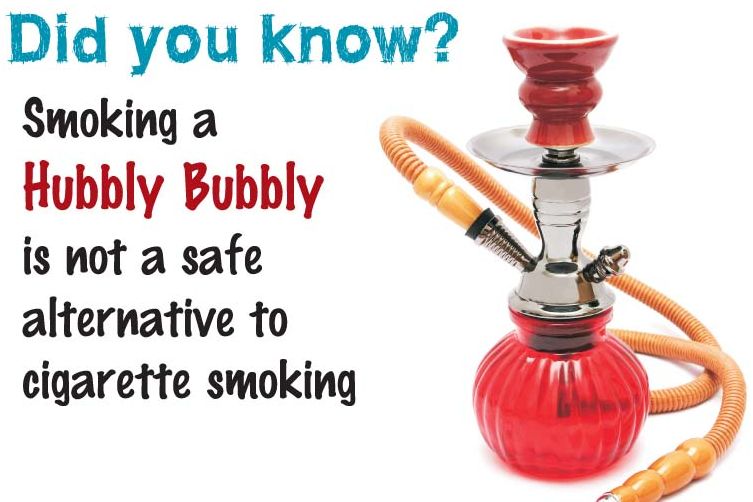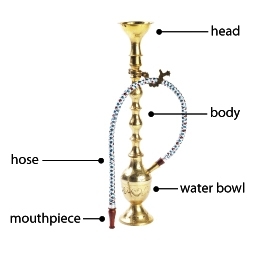Introduction

Hookah smoking has been gaining popularity in recent years, especially among young adults. However, it is important to understand the risks and realities associated with this activity. Hookah, also known as a waterpipe, is a traditional method of smoking tobacco that originated in Persia and India centuries ago. Despite the perception that hookah is less harmful than smoking cigarettes, research indicates that it poses serious health risks. This blog aims to shed light on the negative effects of hookah smoking on respiratory health, oral health, addiction, exposure to harmful chemicals, and long-term health consequences. By raising awareness about these risks, we hope to encourage individuals to quit hookah smoking and protect their well-being.
What Is Hookah?
A hookah, also known as a waterpipe, is a traditional method of smoking tobacco. It originated centuries ago in ancient Persia and India. A typical hookah consists of a head with holes, a metal body, a water bowl, and a flexible hose with a mouthpiece. Hookahs come in various sizes, shapes, and styles. The tobacco is placed in the head and heated with charcoal, producing smoke that is drawn through the water and inhaled through the hose. Hookah smoking is often done in groups, with the same mouthpiece passed from person to person.
Hookah Usage Popularity And Cultural Significance
Hookah usage has gained popularity worldwide, particularly among young adults. Its appeal lies in the social aspect and the perception of it being a trendy and exotic activity. Hookah smoking has become synonymous with relaxation and enjoyment in many cultures, especially in the Middle East and South Asia. It is often seen as a way to bond with friends and engage in deep conversations. However, it is important to recognize that the cultural significance should not overshadow the serious health risks associated with hookah smoking.
Health Risks Of Hookah Smoking

Hookah smoking poses several health risks that individuals should be aware of. The negative effects on the respiratory system are significant, as hookah smoke contains harmful chemicals that can damage the lungs. Additionally, hookah smoking increases the risk of oral health problems, such as gum disease and tooth decay. Nicotine dependency is another concern, as individuals who engage in hookah smoking may become addicted to nicotine. Furthermore, hookah smoking can have a detrimental impact on mental health, potentially leading to symptoms of anxiety and depression. It is crucial to understand the health risks associated with hookah smoking and take steps to quit this harmful habit.
Negative Effects On Respiratory System
Hookah smoking poses serious risks to the respiratory system. The smoke from a hookah contains harmful chemicals, including carbon monoxide, which can damage the lungs and reduce lung function. The inhalation of these chemicals can lead to respiratory problems such as chronic bronchitis and asthma. Hookah smoke also contains fine particles that can irritate the airways and cause inflammation. Prolonged hookah smoking can increase the risk of developing respiratory diseases, including lung cancer. It is important to understand the negative impact of hookah smoking on the respiratory system and take steps to avoid this harmful habit.
Increased Risk Of Oral Health Problems
Consuming hookah poses a considerable risk to oral health. Despite maintaining good oral hygiene practices, individuals who smoke hookah are more likely to experience oral health issues. Research has shown that hookah smokers have a higher prevalence of periodontal diseases compared to non-smokers. These diseases can lead to gum inflammation, tooth decay, and even tooth loss. The harmful chemicals in hookah smoke irritate the gums, causing damage to the tissues and increased susceptibility to oral infections. It is crucial to understand the detrimental impact of hookah smoking on oral health and take steps to prevent its harmful consequences.
Addiction And Dependency

Nicotine dependency is a significant concern among hookah smokers. The nicotine present in hookah smoke can lead to addiction and dependency, making it challenging for individuals to quit smoking. Hookah smoking also affects mental health, increasing the risk of anxiety and depression. The social aspect of hookah smoking can further contribute to the dependency on this harmful habit. It is crucial for individuals to recognize the addictive nature of hookah smoking and seek support to overcome its dependency. Quitting hookah and adopting healthier alternatives can greatly improve overall well-being.
Nicotine Dependency
Nicotine dependency is a significant concern among hookah smokers. The nicotine present in hookah smoke can lead to addiction and dependency, making it challenging for individuals to quit smoking. Hookah smoking has been found to deliver seven times the nicotine exposure and up to nine times the carbon monoxide exposure compared to a single cigarette. This high nicotine intake can lead to a stronger addiction and difficulty in breaking the habit. It is crucial for individuals to recognize the addictive nature of hookah smoking and seek support to overcome its dependency. Quitting hookah and adopting healthier alternatives can greatly improve overall well-being.
Hookah Smoking And Its Impact On Mental Health
Hookah smoking not only poses risks to physical health but also has detrimental effects on mental well-being. Research has shown a link between hookah smoking and increased rates of depression, anxiety, and stress. The nicotine in hookah smoke acts as a stimulant, initially providing a sense of relaxation and pleasure. However, prolonged use can result in dependency and withdrawal symptoms, exacerbating mental health conditions. Additionally, the social aspect of hookah smoking may contribute to peer pressure and social anxiety, further compromising mental well-being. It is important to consider the negative impact hookah smoking can have on mental health and to seek support if experiencing any related issues.
Exposure To Harmful Chemicals

Exposure to Harmful Chemicals:
Hookah smoking exposes individuals to a wide range of harmful chemicals, including at least 82 toxic compounds and carcinogens. Despite the water filtration process, these hazardous substances are still released into the smoke. Additionally, the combustion of charcoal used to heat the tobacco can produce dangerous substances such as carbon monoxide, metals, and other chemicals. This means that even after passing through water, the smoke from a hookah still contains high levels of toxic agents. It is important to be aware of the serious health risks associated with the exposure to these harmful chemicals when engaging in hookah smoking.
Analysis Of Chemicals Found In Hookah Smoke
Analysis of chemicals found in hookah smoke has revealed the presence of numerous harmful substances. According to studies, hookah smoke contains at least 82 toxic chemicals and carcinogens. These include nicotine, tar, carbon monoxide, heavy metals, and other hazardous compounds. Despite the misconception that water filtration eliminates these harmful substances, the truth is that it does not effectively remove them. Therefore, inhaling hookah smoke exposes individuals to the risk of developing various health conditions, including respiratory diseases, oral health problems, and even cancer. It is crucial to be aware of these findings and make informed decisions regarding hookah smoking.
Comparison Of Hookah Smoke With Cigarette Smoke
Hookah smoke is often mistakenly believed to be less harmful than cigarette smoke. However, studies have shown that hookah smoke contains many of the same harmful components as cigarette smoke, including nicotine, tar, and heavy metals. In fact, the smoke from a hookah is at least as toxic as cigarette smoke. Additionally, due to the way a hookah is used, individuals who smoke hookah may actually absorb more of these toxic substances than those who smoke cigarettes. During a typical 1-hour hookah session, users may inhale 100-200 times the amount of smoke as from a single cigarette. It is essential to recognize the significant health risks associated with hookah smoking and treat it with the same level of concern as cigarette smoking.
Hookah Smoking And Long-term Health Consequences

Hookah smoking can have serious long-term health consequences. Studies have shown that regular hookah use is associated with impaired pulmonary function, increased risk of chronic obstructive pulmonary disease (COPD), and an elevated likelihood of developing esophageal and gastric cancer. The harmful chemicals and toxins in hookah smoke can cause lasting damage to the lungs and other organs over time. It is important to understand and recognize these long-term health risks associated with hookah smoking in order to make informed decisions about our health.
Increased Risk Of Cardiovascular Diseases
Hookah smoking poses an increased risk of cardiovascular diseases. The harmful chemicals and toxins in hookah smoke can damage the lining of the arteries, leading to the development of plaque and narrowing of the blood vessels. This can result in various cardiovascular conditions such as high blood pressure, heart disease, and increased risk of heart attacks and strokes. Additionally, the nicotine in hookah smoke can cause an increase in heart rate and blood pressure, further straining the cardiovascular system. It is important to be aware of these risks and take steps to protect our cardiovascular health by avoiding hookah smoking.
Potential Development Of Cancer
Hookah smoking has been linked to an increased risk of developing various types of cancer. The charcoal used to heat the tobacco can produce high levels of cancer-causing chemicals, even after passing through water. Hookah tobacco and smoke contain toxic agents that can lead to oral, lung, stomach, and esophageal cancers. Additionally, the juices from hookahs can irritate the mouth, further increasing the risk of oral cancers. Therefore, regularly smoking hookah can potentially lead to the development of cancer and should be avoided to protect health.
Conclusion

In conclusion, it is crucial to spread awareness about the risks of hookah smoking. The popularity of hookah usage, coupled with the misconception of it being a safer alternative to cigarette smoking, has led to a significant increase in its consumption, particularly among college students. However, research has shown that hookah smoking carries numerous health risks, ranging from negative effects on respiratory and oral health to addiction and exposure to harmful chemicals. It is important for individuals to understand the potential long-term consequences, such as an increased risk of cardiovascular diseases and cancer, associated with hookah smoking. Resources and support should be provided to promote quitting this harmful habit and protect public health.
Importance Of Spreading Awareness Of The Risks Of Hookah Smoking
Spreading awareness about the risks of hookah smoking is crucial in order to protect public health. With the increasing popularity of hookah usage, particularly among college students, it is important for individuals to understand the potential long-term consequences associated with this habit. By educating people about the negative effects on respiratory and oral health, addiction and dependency, exposure to harmful chemicals, and the increased risk of cardiovascular diseases and cancer, we can empower individuals to make informed decisions and potentially quit hookah smoking. Resources and support should be provided to promote the importance of quitting this harmful habit and safeguard the well-being of individuals.
Tips And Resources For Quitting Hookah Smoking
Quitting hookah smoking can be challenging, but with the right tips and resources, it is possible to overcome this harmful habit. Here are some strategies to help individuals quit hookah smoking:
- Seek support: Reach out to friends, family, or support groups who can provide encouragement and guidance throughout your quitting journey.
- Set a quit date: Choose a specific date to stop smoking hookah and stick to it. This can help create a sense of commitment and motivation.
- Find healthier alternatives: Replace the hookah habit with healthier alternatives, such as exercise, hobbies, or engaging in activities that promote relaxation.
- Nicotine replacement therapy: Consider using nicotine replacement products, such as nicotine gum or patches, to help manage withdrawal symptoms.
- Behavioral therapy: Seek professional help from a therapist or counselor who specializes in addiction and can provide strategies and support tailored to your needs.
- Stay motivated: Remind yourself of the reasons why you want to quit hookah smoking and visualize the benefits of a smoke-free life.
Resources for quitting hookah smoking:
- National Cancer Institute’s Quitline: Offers free, confidential support and resources to help individuals quit smoking.
- Smokefree.gov: Provides a variety of tools, tips, and resources for quitting smoking, including hookah.
- American Lung Association: Offers online support groups, educational materials, and resources for quitting smoking, including hookah.
By combining these tips and utilizing available resources, individuals can increase their chances of successfully quitting hookah smoking and improving their overall health.
FAQ: Why Hookah is Bad
Q: What is hookah?
A: Hookah, also known as shisha or water pipe, is a traditional device used for smoking tobacco. It typically consists of a water bowl, a pipe, and a hose or mouthpiece.
Q: Why is hookah considered bad for health?
A: Hookah is considered bad for health due to several reasons. Firstly, it exposes users to harmful chemicals and toxins that can lead to various health problems. It can be more harmful than smoking cigarettes due to the prolonged sessions and the deeper inhalation of smoke.
Q: What are the health risks associated with hookah smoking?
A: Hookah smoking poses various health risks such as:
- Toxic Chemicals: Hookah smoke contains numerous toxic chemicals, including nicotine, carbon monoxide, formaldehyde, and heavy metals. These substances can increase the risk of developing respiratory and cardiovascular diseases.
- Cancer: The smoke produced by burning tobacco in hookah contains harmful carcinogens that can lead to lung, mouth, throat, and esophageal cancer.
- Spread of Infectious Diseases: Sharing a hookah mouthpiece can increase the risk of transmitting infectious diseases like tuberculosis, herpes, and influenza.
- Addiction: Hookah tobacco contains nicotine, which is highly addictive. Regular hookah smoking can lead to dependence and make it difficult to quit.
Q: Is hookah a safer alternative to smoking cigarettes?
A: No, hookah is not a safer alternative to smoking cigarettes. While some people may think that the water filtration process in hookah removes harmful substances, it only partially reduces the toxins in the smoke. Hookah smoking still exposes users to significant health risks.
Q: Can hookah smoking affect non-smokers or passive smokers?
A: Yes, hookah smoking can also affect non-smokers or passive smokers who inhale the secondhand smoke. They can experience similar health risks associated with direct hookah smoking, including respiratory problems and an increased risk of cancer.
Q: Can hookah smoking be addictive?
A: Yes, hookah smoking can be addictive due to the presence of nicotine. Nicotine addiction can lead to a range of physical and psychological withdrawal symptoms when attempting to quit.
Q: Are there any age restrictions for hookah smoking?
A: The legal age for hookah smoking varies between countries and regions. However, it is generally prohibited for individuals under the legal smoking age.
Q: Are there any regulations or bans on hookah smoking?
A: Some countries, states, or cities have implemented regulations or bans on hookah smoking in public places, restaurants, and bars to protect public health. It is essential to adhere to local laws and regulations regarding hookah smoking.
Q: How can one quit hookah smoking?
A: Quitting hookah smoking can be challenging due to nicotine addiction. However, one can seek professional help or utilize smoking cessation methods such as counseling, nicotine replacement therapy, or medications to quit successfully.
Remember, making informed choices about our health and well-being is crucial. It is advisable to avoid or quit hookah smoking to reduce the associated health risks.

Bites ‘N’ Pipes is a hookah lounge with a full bar and fabulous food. Come relax and hang with friends in a chill place. We are featuring everything you need for a good time. We have it all: WiFi, streaming your own music, foosball, comfy couches, delicious food, a pool table, great drinks, and sensational hookah. Plus, smoke anywhere! Bites’ N’ Pipes is the place for a low-key party or hanging out low-key. Check out our food menu and hookah flavors from the links above. Come make memories with us!